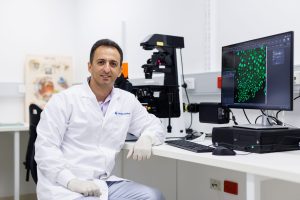Two researchers from the Lions Eye Institute have been awarded critical funding through the WA Near Miss Awards, a state initiative designed to support high-potential health projects that narrowly missed out on national funding. Dr Danial Roshandel’s research with stem cells in the eye and Dr Jessica Mountford’s ground-breaking work on the genetic and environmental contributors to high myopia have both earnt themselves research grants from the WA Near Miss Awards.
Funded by the WA Government’s Future Health Research and Innovation (FHRI) Fund, the WA Near Miss Awards provide a vital second-chance opportunity through two categories:
-
Emerging Leaders
-
Ideas Grants
These grants aim to support Western Australian researchers who scored competitively in their National Health and Medical Research Council (NHMRC) submissions but missed out due to limited national funding.
Understanding and slowing high myopia progression

Dr Jessica Mountford
Myopia, commonly referred to as short-sightedness is the second leading cause of disability in the world. With rapidly increasing prevalence over recent decades as modern-day living amplifies our exposure to near-work, such as reading, screen-time, studying, and less time spent outdoors, it remains a major contributor to global socio economic and health burden.
Early-onset myopia in childhood carries a greater risk of developing high myopia, a serious condition associated with severe ocular disease, such as retinal detachment, retinal atrophy, maculopathy, cataracts, glaucoma and permeant vision loss. Dr Jessica Mountford and her team aims to investigate how both genetic and environmental risk factors interact and contribute to progression of myopia.
Through scrutinising human genetic variants associated with myopia using their high throughput zebrafish ocular screening platform, they aim to establish the role of identified genes to enable the development of specific pharmaceutical targeting and novel treatment strategies. Additionally, they aim to provide evidence for screening at-risk children and facilitate implementation of preventative measures across multidisciplinary fields including policy makers, government, medical research, clinicians and educational institutions.
Advancing human stem cell technology to treat corneal blindness

Dr Danial Roshandel
Stem cells in the front part of the eye play a crucial role in maintaining vision. These cells can be damaged by injury, disease, or overuse of contact lenses, leading to vision loss. Currently, repairing corneal surface injuries requires donor stem cells.
Dr Danial Roshandel is leading efforts on using stem cells derived from a person’s own skin to repair the cornea, and converting these skin cells into corneal cells to study how they interact to support each other in the healing process. Additionally, his team will grow these cells on a sheet and transplant them into a preclinical model to evaluate their effectiveness and safety in treating blindness caused by ocular surface injuries.
A platform for promising talent
The WA Near Miss Awards are a lifeline for talented researchers at pivotal points in their careers, ensuring that promising health innovations don’t stall due to lack of funding.
To learn more about the WA Near Miss Awards and this year’s recipients, visit the FHRI Fund website.



